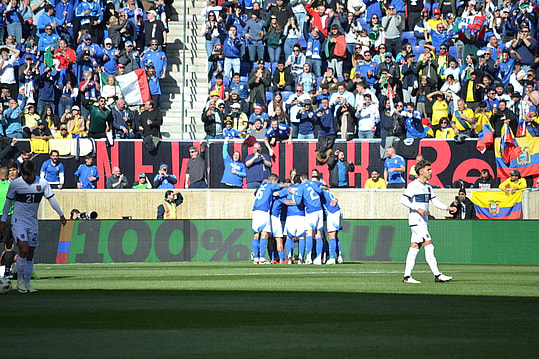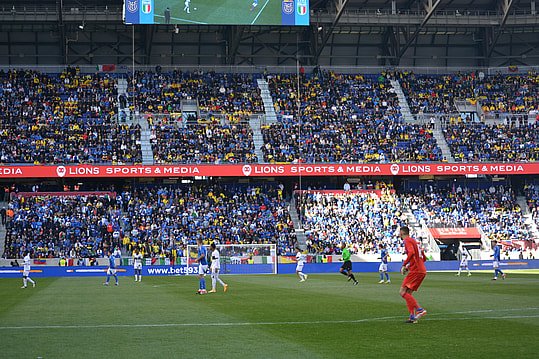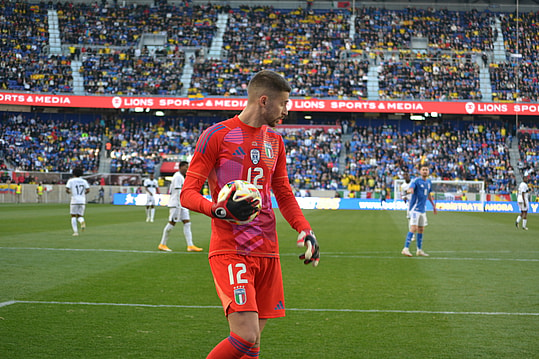
The match between Italy and Ecuador over the weekend was filled with history. Brief but significant nonetheless. This was only the third official meeting between both nations since their first encounter in the 2002 Korea-Japan World Cup tournament. Some names that took part in that first duel for Ecuador included Agustin Delgado, Jose Francisco Cevallos, Ivan Hurtado, Edison Mendez, and Alex Aguinaga.
A solid squad that took on the nation’s first-ever World Cup match against the likes of Francesco Totti, Alessandro Nesta, Christian Vieri, and Paolo Maldini. Italy won that match after Vieri scored twice, but Ecuador had announced itself to the football world. On the other hand, Italy enjoyed a period of dominance in the following years, including a World Cup win and a Euro final in 2012.

Reality check at Red Bull Arena
The reality of both sides is far from where it used to be. Both Italy and Ecuador are in a rebuilding process ahead of their participation in the upcoming international competitions. We might not see the results this summer, but it’s a good checkpoint, as their end goal is the 2026 World Cup. The international break allowed both teams a chance to play two fixtures, so they each arrived with a win before their match this past Sunday. Ecuador’s win against Guatemala ensured that they would display their best version, having rested their best players. Italy had to come back from behind against Venezuela, but they managed to win. On paper, it was an even match, but in the end, it was more of a reality check for both teams.
Ecuador brought out a lineup with European experience for this game. Moises Caicedo, Jeremy Sarmiento, Pervis Estupiñan, and Piero Hincapie took on an Italian side ready for the challenge. Nicolo Zaniolo, Matteo Darmian, Jorginho, and Lorenzo Pellegrini looked to counter any momentum Ecuador hoped to obtain during the match. The fixture was deemed to be a duel between speed and tactical awareness. It was the perfect approach for the squad led by Luciano Spalletti but a heavy mistake for the Ecuadorian side.

The tone of the match throughout the 90 minutes was a constant reminder of that first encounter in 2002. Italy displayed its physical advantage, while Ecuador relied on the speed that the wingers could provide. The Italians quickly settled on the field as Ecuador’s game plan was straightforward. So much that it only took 3 minutes for them to get ahead, Lorenzo Pellegrini took advantage of a rebound after a freekick to put Italy ahead. The early advantage stunned Ecuador for the remainder of the match and changed the perception of the game from inside and outside the field.
‘La Tri’ immediately started relying on individualities to surpass the Italian lines. The approach worked with Guatemala, but it was as if they forgot who they were playing against. Speed was a quality that Ecuador did manage to exploit, but it turned ineffective as quickly as it was used.
The team either held the ball too long, or the player took on individual duels rather than playing collectively. Combining that with the unnecessary fouls in Italy’s favor never allowed the game to have a consistent flow. Italy kept their game plan untouched, staying in defense and cutting off the passing rhythm in midfield. The rest was won through their physicality.
Things didn’t change so much for the second half. Italy brought back the ‘Catenaccio’ with more defensive introductions. Giovanni Di Lorenzo and Davide Frattesi both came in midway through the second half. Ecuador brought in Kendry Paez to add more creativity to the match, but the physical superiority was a defining factor in this game. Ecuador was unable to find spaces. Yes, there were some instances of brilliance from Kendry Paez, but as I said before, it was more individualistic than anything else. Statistically speaking, Ecuador had most of the possession throughout the game with 51%, but that’s in part because Italy gave up the ball during the second half. All it took was one counterattack to catch Ecuador out of position, and Nicolo Barela scored the second and winning goal.
In the end, the result reflected what many had been fearing: Ecuador has yet to find a game style. The victory against Guatemala did show glimpses of what the idea could have been. But keep in mind that Ecuador’s last European rival was the Netherlands, over two years ago.

If you compare those two games side by side, things don’t look good, a golden generation that is on the brink of being lost by inconsistency. Italy’s case, however, is the complete opposite. A squad that continues to build up around an idea, a bit defensive, but an idea close to their philosophy. It helps to know that legends like Buffon and Canavaro are behind Italy’s rebuilding project.
The result outlines the tasks to be worked on ahead of the Euros and the Copa America, respectively. Both teams will look to fix any mistake before their competitions. Italy will be looking to add the finishing touches in the attacking third. While Ecuador will have to rely on tactical corrections to things to flow correctly again.
In general terms, it was a match worth the wait. Knowing that this was only the third time these two teams played each other, the atmosphere lived up to the occasion. It’s crazy to think that I went from watching this match on TV as a kid to writing about it 22 years later.